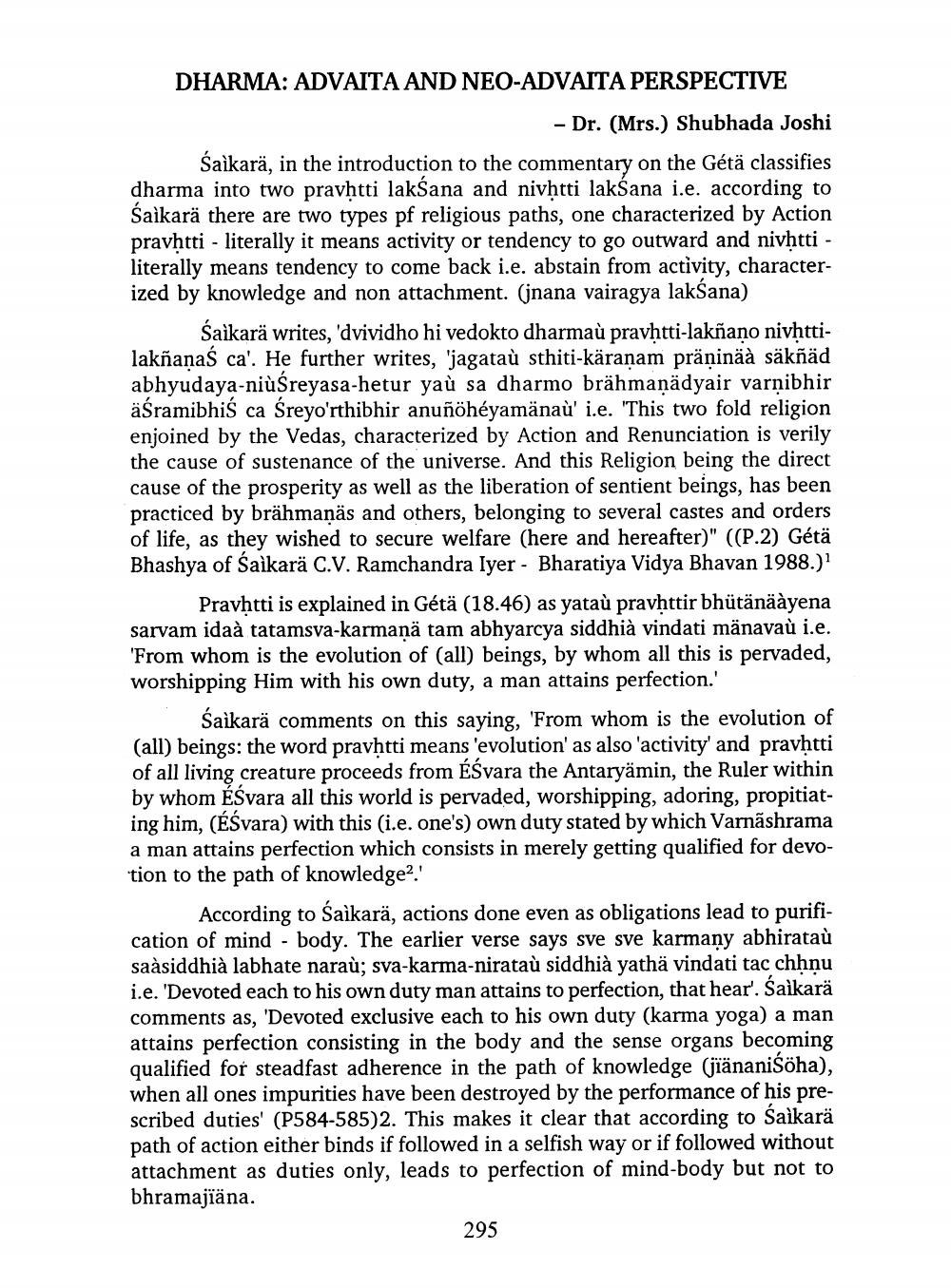________________
DHARMA: ADVAITA AND NEO-ADVAITA PERSPECTIVE
- Dr. (Mrs.) Shubhada Joshi
Śaikara, in the introduction to the commentary on the Gétä classifies dharma into two pravḥtti laksana and nivḥtti laksana i.e. according to Śaikarä there are two types pf religious paths, one characterized by Action pravḥtti - literally it means activity or tendency to go outward and nivḥtti - literally means tendency to come back i.e. abstain from activity, characterized by knowledge and non attachment. (jnana vairagya laksana)
Śaikarä writes, 'dvividho hi vedokto dharmaù pravḥtti-lakñaṇo nivḥttilakñanaś ca'. He further writes, 'jagataù sthiti-käraṇam präninäà säkñäd abhyudaya-niùśreyasa-hetur yaù sa dharmo brähmaṇädyair varṇibhir äŚramibhiś ca Śreyo'rthibhir anuñöhéyamänaù' i.e. "This two fold religion enjoined by the Vedas, characterized by Action and Renunciation is verily the cause of sustenance of the universe. And this Religion being the direct cause of the prosperity as well as the liberation of sentient beings, has been practiced by brähmanäs and others, belonging to several castes and orders of life, as they wished to secure welfare (here and hereafter)" ((P.2) Gétä Bhashya of Saìkarä C.V. Ramchandra Iyer - Bharatiya Vidya Bhavan 1988.)1
Pravḥtti is explained in Gétä (18.46) as yataù pravḥttir bhütänäàyena sarvam idaà tatamsva-karmaṇä tam abhyarcya siddhià vindati mänavaù i.e. 'From whom is the evolution of (all) beings, by whom all this is pervaded, worshipping Him with his own duty, a man attains perfection.'
Śaikarä comments on this saying, 'From whom is the evolution of (all) beings: the word pravḥtti means 'evolution' as also 'activity' and pravḥtti of all living creature proceeds from ÉŚvara the Antaryämin, the Ruler within by whom ÉŚvara all this world is pervaded, worshipping, adoring, propitiating him, (ÉŚvara) with this (i.e. one's) own duty stated by which Varnashrama a man attains perfection which consists in merely getting qualified for devotion to the path of knowledge2.
According to Saikarä, actions done even as obligations lead to purification of mind body. The earlier verse says sve sve karmany abhirataù saàsiddhià labhate naraù; sva-karma-nirataù siddhià yathä vindati tac chhnu i.e. 'Devoted each to his own duty man attains to perfection, that hear'. Śaìkarä comments as, 'Devoted exclusive each to his own duty (karma yoga) a man attains perfection consisting in the body and the sense organs becoming qualified for steadfast adherence in the path of knowledge (jiänaniśöha), when all ones impurities have been destroyed by the performance of his prescribed duties' (P584-585)2. This makes it clear that according to Saìkarä path of action either binds if followed in a selfish way or if followed without attachment as duties only, leads to perfection of mind-body but not to bhramajïäna.
295




